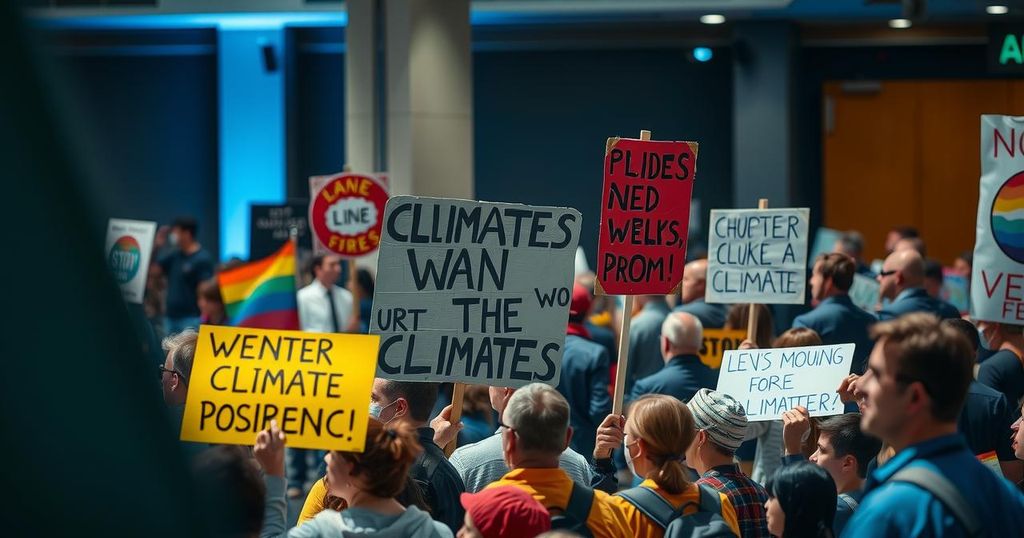Evaluating COP: A Call for Accountability in Climate Negotiations

The Conference of Parties (COP) plays a critical role in addressing climate change, yet its effectiveness has come under scrutiny due to a lack of accountability for member nations and controversies surrounding its leadership. Despite significant pledges, many countries fail to meet their commitments, and conflicts of interest among leaders raise ethical concerns. Without enforcement mechanisms, COP risks perpetuating the issue it seeks to combat, necessitating transformative changes for future meetings.
The Conference of Parties (COP) has emerged as a notable platform aimed at pursuing international responses to the pressing issue of climate change. Despite its significance, many are questioning COP’s efficacy as past conferences have failed to produce meaningful commitments, leaving the world at risk as climate crises worsen. The concerns were once again articulated by renowned broadcaster David Attenborough during the COP26 meeting, suggesting that humanity’s short-sightedness might culminate in dire consequences for our planet. This year, COP29 is set to convene in Baku, Azerbaijan. However, given the historical context of previous summits, skepticism reigns regarding the likelihood of substantial progress. The main objective of COP is to facilitate discussions involving the 198 participating countries, focusing on pledges towards achieving net-zero emissions and collaborating under the framework of the Paris Agreement. The stakes are undeniably high, yet the actual results appear meager, leading to mounting frustration among advocates for environmental action. A significant shortcoming of COP is its lack of legal accountability for member states. Nations make pledges, yet these commitments are not enforceable. The largest carbon emitters, including China, the United States, India, and Russia, have remained largely unresponsive, failing to reinforce their climate commitments. Climate expert Stephen Aykut aptly remarks that COP should act as a mechanism for accountability among nations, which it currently does not. According to the Paris Agreement, each country is required to present a Nationally Determined Contribution (NDC) every five years, outlining their climate action plans. However, data reveals that many countries are falling short in complying with these expectations. A 2023 study from Imperial College London indicates that only a minority of nations uphold credible net-zero pledges, and several recent policy reversals demonstrate a disturbing trend away from climate commitments. Moreover, the governance of COP has come under scrutiny, especially following the selection of Dr. Sultan Ahmed Al Jaber as President during COP28. Despite his credentials in climate advocacy, his position as CEO of a major oil corporation sparked allegations of conflicts of interest. A Global Witness investigation revealed an attempt to capitalize on COP’s influence for significant fossil fuel investments. With COP29 approaching, the pattern of selecting oil and gas executives for leadership roles raises serious ethical questions about the integrity of climate negotiations. Without a robust mechanism to enforce compliance or raise accountability, COP risks becoming a superficial dialogue rather than a genuine framework for progress in combating climate change. COP must transition from being a platform for promises to a body that holds nations accountable for actionable results. Without this shift, it may only perpetuate the very climate crises it is meant to address. In conclusion, while COP serves an essential role in fostering dialogue on climate policy, its effectiveness is marred by a lack of accountability, commitment, and ethical governance. Unless significant reforms are implemented, COP may continue to fall short of its monumental responsibility in addressing the climate emergency. The message is clear — COP must evolve beyond appeasing rhetoric to enforceable action to avert climate catastrophe.
Climate change represents one of the most formidable challenges facing humanity today. The Conference of Parties (COP) exemplifies a collective international effort aimed at mitigating this crisis through cooperative agreements and commitments. Despite these noble intentions, the preceding conferences often left observers disillusioned as many announced pledges lack enforcement mechanisms, failing to translate into meaningful action. Accountability and transparency are paramount for COP to inspire confidence, but ongoing controversies and inadequate standards have prompted calls for reform.
In summary, the COP process, while historically significant, requires urgent reforms to enhance accountability and enforce commitments made by member states. The challenges posed by conflicts of interest within leadership roles, combined with the lack of binding commitments, jeopardize the potential outcomes of these meetings. For COP to fulfill its role in climate action effectively, there must be a strategic focus on actionable commitments and ethical governance, clearly addressing the rising climate emergency.
Original Source: www.shoutoutuk.org






